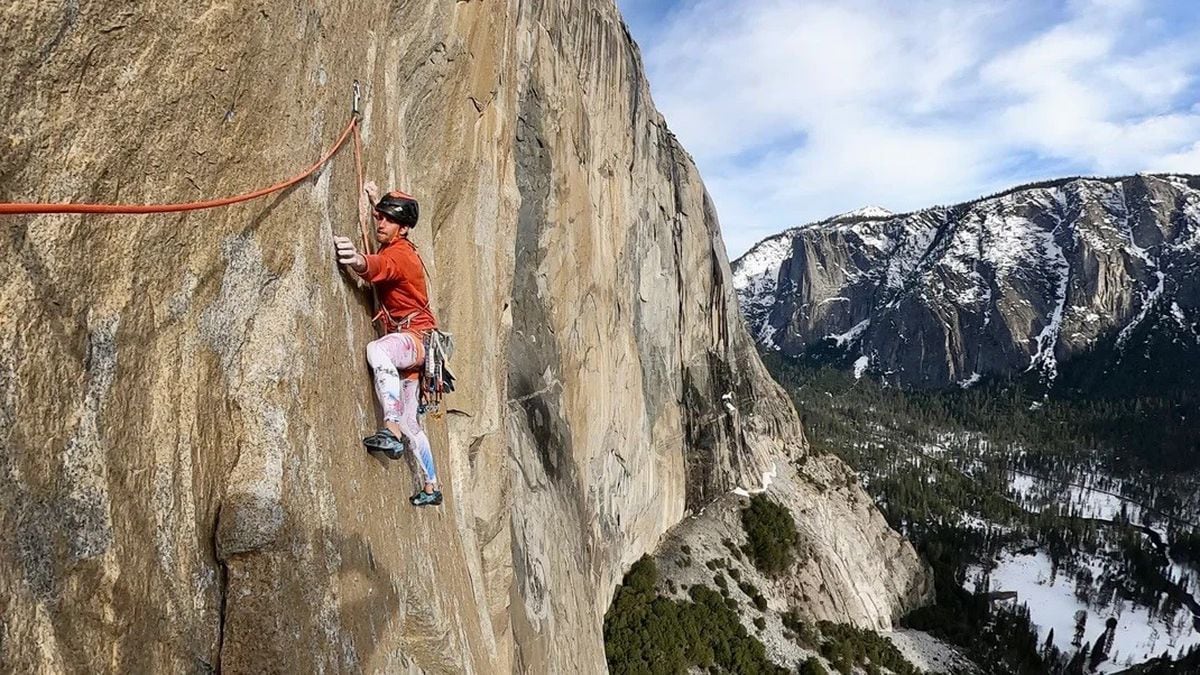Imagine that the cyclist Primoz Roglic walks to the Tour de France from his native Slovenia.
Despite his exhaustion and lack of training, he is able to finish second.
Belgian climber Seb Berthe imagined something similar last fall: his Tour de él would be the most difficult wall route on the planet, located in the Californian Yosemite Valley.
He would not arrive on foot, but on a trans-Atlantic sailboat journey.
He didn't manage to free-climb the wall: he fell over and over during the climb's final pitch.
So we can say that he came in second on his own Tour–all as a protest against climate change.
Once-majestic mountains now look like great wounded animals crumbling before our eyes: seracs fall like drying scabs, glaciers wither like fish washed up on a beach, towers of granite and limestone crumble and ice retracts and disappears.
The climbers are left without a playing field and the human being without a planet.
Does anyone care?
Almost two years ago, the Belgian big wall climber Sébastien Berthe decided that something had to change in his lifetime.
His own contradictions of him, and the generalized hypocrisy in the world of mountaineering, caused him such discomfort that he decided to take the message of his sponsor of him, Patagonia, at face value.
Since then, he has not traveled by plane, seeking the most sustainable transport options possible.
He tries to stay close to home;
he fights not to be a frenzied consumerist.
Now, the how is once again more important than the what.
It's not just a question of climbing style, but a way of understanding his love for the mountains.
Mountaineering has always struggled to justify itself.
Its tragedies evoke both disgust and admiration.
Now,
its actors may only have to be activists of their passion for the mountains.
Each ascent and each new record is an excuse to defend a natural environment on its way to collapse.
The hardest known wall route is called Dawn Wall and is located in El Capitan, Yosemite.
Its key pitch has a difficulty of 9a.
Its creators, and the first to climb the route free–without holding onto aids–were Tommy Caldwell and Kevin Jorgenson.
They invested seven years of work to open the route and climb it free, and they achieved it in 2015. In 2016, the Czech Adam Ondra, considered the best climber in history, achieved the second free climb after a week on the wall.
Seb Berthe wanted to be the third, but in his own way: he had to travel from Belgium to California without flying.
So he convinced seven friends, one of them a sailor, to cross the Atlantic in a 15-meter sailboat.
The boat had been docked for a decade.
She had to be conditioned to sail and equipped with training equipment.
But Seb Berthe barely trained on the journey:
when he was not sick or seasick, the sea was rough.
I have assumed that he would not make it to Yosemite in shape.
View this post on Instagram
A post shared by Sébastien Berthe (@sebertheclimber)
The crew sailed for a month and docked the ship in Mexico, since their three-month permit to stay in the United States did not allow them to dock in one of its ports.
From the day they set sail from Spain's Canary Islands to the moment they reached Yosemite, two and a half months had passed.
It didn't seem like the best way to approach one of the toughest climbing challenges out there.
Berthe and his friend Siebe Vanhee worked the route for a month and a half.
When they launched their final attack, they got stuck on the key pitch.
They remained there for two weeks, hanging from the wall in hammocks.
They climbed the same pitch for seven days and rested another seven.
Inevitably, Seb Berthe fell on the last step.
“I could not make it in the time I had given myself as the food and water I had hauled were over.
For decades, mountaineers refused to consider themselves athletes.
Theirs, they claimed, was not a sport but a way of life, a form of relating to the natural environment and escaping from a society in which they found no authentic stimuli.
Today, things are changing rapidly.
Many mountaineers are beginning to embrace training to take on increasingly complex challenges, while trying not to abandon the essence of their activity.
Seb Berthe's supposed “failure” is an achievement worthy of admiration, recalling the sport's pioneers in a world before globalization.
Not so long ago, before flying by plane was so accessible, climbers, mountaineers and alpinists spent months on trips to take advantage of the challenges at hand.
The Schmid brothers traveled by bicycle from Munich to Zermatt to ascend the Matterhorn in 1931. At the time,
they had no other choice.
Now other circumstances oblige.
Perhaps Seb Berthe will be remembered as the man who fell on the last step of the Dawn Wall, or as the guy who encouraged others to rethink their consumerist approach to the mountains.

